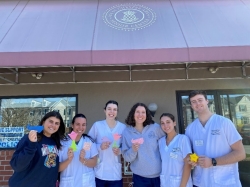Origami: More than Folding Paper

On March 29, senior nursing students helped Chester County residents with Parkinson’s Disease (PD) stay active through a creative project using origami. After leading participants in warm up exercises for their hands, the students shifted to demonstrating how to fold paper for a variety of shapes which engaged the members of the support group and gave them another tool in living with PD. (L-R: Juliana Russo, Celia Argiriou, Ava Rogers, Jess Cherubino, Sophia Paolucci and Eion Howley.
Six senior nursing students in their Home Health clinical rotation had the opportunity to explore a different way of promoting health for people in the community with chronic disease. At the request of the facilitator working with the Parkinson's Disease Support Group run by Penn Medicine at Home as part of its larger Senior Health Link (SHL) in Chester County at the West Chester Area Senior Center in West Chester, Pa., they assisted with the March 29 creative therapy session focused on origami, the Japanese art of paper folding.
Janet Elliott, MSN, RN, adjunct clinical instructor, explains that SHL is a program that started in 1989 where nursing students make free home visits to older adult clients in Chester County who do not qualify for home care. “Their goal is to help them maintain their optimal level of wellness and remain in their homes as long as possible,” she says, adding, “Most clinical days they performed home visits to patients with a variety of diagnoses to do assessments and provide socialization, patient education and share community resource information. These visits promote health and independence in the home and also prevent re-hospitalization.”
The SHL outreach coordinator also facilitates the monthly Parkinson's Support Group and requested the students' assistance at the March meeting which she organized for the participants to engage in origami as a therapeutic exercise based on a Parkinson's program from India.
“I have seen my grandfather, who has advanced Parkinson’s, work with physical therapists, occupational therapists, and nurses to improve his walking and fine motor skills,” says senior Ava Rogers, noting, “So I was really excited to work with the Parkinson’s support group at clinical because the patient population is close to my heart. This experience was different than home health and bedside nursing because we focused on one specific intervention: making origami.” Ava viewed it as a creative way to encourage the use of fine motor skills, and says the patients and family members ‘responded well to the non-traditional intervention,’ even taking the instructions and extra origami paper home. She explains, “From a nursing perspective, it opened my mind up to more innovative ways to approach healthcare. I think sometimes people view nursing as a scientific, systematic job, but there are ways to incorporate creativity into care.”
The partnership was a positive one. “The West Chester participants are advocates for Parkinson's research and events, and very educated on treatments and therapies,” says Elliott. “The attendees really enjoyed the student interaction and found it stimulating.”
